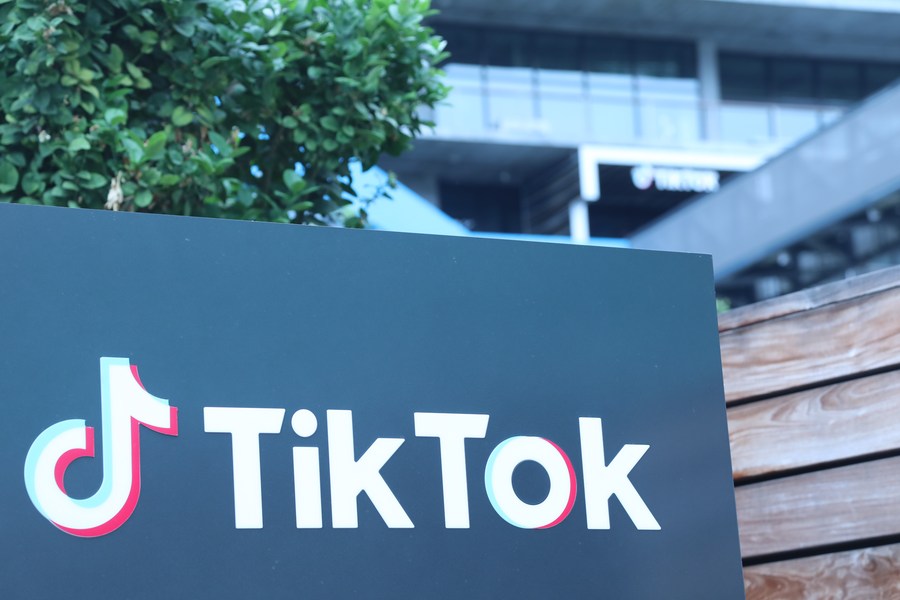

The review of the source code, a core trade secret and core asset of Internet enterprises, has become a focus of the "TikTok transaction" agreement.
What is particularly noteworthy is that the source code of super-large social media platforms such as TikTok contains a large amount of personal information, which, if improperly used, will not only threaten personal privacy, but can also pose an immediate and real threat to public interests and national security.

Photo taken on Aug. 21, 2020 shows a logo of the video-sharing social networking company TikTok's Los Angeles Office in Culver City, Los Angeles County, the United States. (Xinhua)
According to CNN and other U.S. media reports, relevant statements from Oracle and Wal-Mart show that once the "agreement" is signed, U.S. enterprises and the U.S. government will obtain the full source code of TikTok under the disguise of "reviewing" the code.
Due to the U.S. government’s past bad record, one cannot help but suspect they will take advantage of the opportunity to directly or indirectly obtain the source code of Douyin, which is operated separately from TikTok.
Artificial intelligence push algorithms, models and codes obtained from Chinese users of Douyin, the Chinese version of TikTok, will also be exposed to some risks.
"Personalized information push service technology based on data analysis and artificial intelligence interactive interface technology" are the core assets of ByteDance, the parent company of TikTok.
It is precisely because of these core technologies that the number of Douyin's daily active users exceeded 400 million as of January 5, 2020, maintaining an astonishing growth rate over the past three years of operation.
If the information disclosed by the U.S. media is confirmed, it means that the privacy of massive Chinese users is at risk of disclosure, threatening China's national security.
It is a matter of national security and there must be zero tolerance in the face of any possible threat.
With sufficient reasons to question the motives of the U.S., it is perfectly normal for Chinese people to be concerned about China's national security interests and whether the legitimate overseas interests of Chinese enterprises can be effectively protected.
After the United States Presidential Election of 2016, there was an investigation into the alleged use of social media by foreign governments to intervene in the election. The survey shows that there are obvious loopholes in Facebook's management of user data, allowing a company called Cambridge Analytics to obtain huge amounts of user data and accurately deliver political advertisements, which can ultimately affect the behavior of users.
The U.S. own case shows that no sovereign country can allow its political security to be exposed as such. In terms of source code security, it is necessary to prevent trouble, strengthen management and avoid risks.
More importantly, the reason for questioning and worrying about the security of the “TikTok transaction” stems from the U.S. government's bad record in related fields.
As the most typical country in cyber hegemony, the U.S. government seeks to expand its sovereignty in global cyberspace in an extremely simple and brutal way, not only disrespecting the core interests of other countries, but also unscrupulously pursuing double standards.
Based on people's anger with the U.S. government's acts over issues, such as the echelon surveillance program, PRISM surveillance program, and having forcible access to data stored by Microsoft servers in Ireland, along with the various intimidation of TikTok by the U.S. on the grounds of national security threats in the absence of substantive evidence, there is every reason to believe that this “TikTok transaction” is being conducted in a harsh environment where credibility is close to zero.
The information disclosed so far has also fully shown that the agreement for the “TikTok transaction” is based on inequality. If the forced “TikTok transaction” succeeds, potential benefits of all parties in the U.S. could be as high as hundreds of billions of dollars.
In face of such an "easy-to-earn" business, why does the U.S. still need to start a new business or finance new ventures? Why does it not act as a bandit instead to rob Chinese enterprises?
The U.S government and American enterprises should be aware that Chinese enterprises are backed by a strong country, and the "unequal treaties" cannot be signed by the U.S. as it wishes.
 Fire brigade in Shanghai holds group wedding
Fire brigade in Shanghai holds group wedding Tourists enjoy ice sculptures in Datan Town, north China
Tourists enjoy ice sculptures in Datan Town, north China Sunset scenery of Dayan Pagoda in Xi'an
Sunset scenery of Dayan Pagoda in Xi'an Tourists have fun at scenic spot in Nanlong Town, NW China
Tourists have fun at scenic spot in Nanlong Town, NW China Harbin attracts tourists by making best use of ice in winter
Harbin attracts tourists by making best use of ice in winter In pics: FIS Alpine Ski Women's World Cup Slalom
In pics: FIS Alpine Ski Women's World Cup Slalom Black-necked cranes rest at reservoir in Lhunzhub County, Lhasa
Black-necked cranes rest at reservoir in Lhunzhub County, Lhasa China's FAST telescope will be available to foreign scientists in April
China's FAST telescope will be available to foreign scientists in April "She power" plays indispensable role in poverty alleviation
"She power" plays indispensable role in poverty alleviation Top 10 world news events of People's Daily in 2020
Top 10 world news events of People's Daily in 2020 Top 10 China news events of People's Daily in 2020
Top 10 China news events of People's Daily in 2020 Top 10 media buzzwords of 2020
Top 10 media buzzwords of 2020 Year-ender:10 major tourism stories of 2020
Year-ender:10 major tourism stories of 2020 No interference in Venezuelan issues
No interference in Venezuelan issues
 Biz prepares for trade spat
Biz prepares for trade spat
 Broadcasting Continent
Broadcasting Continent Australia wins Chinese CEOs as US loses
Australia wins Chinese CEOs as US loses